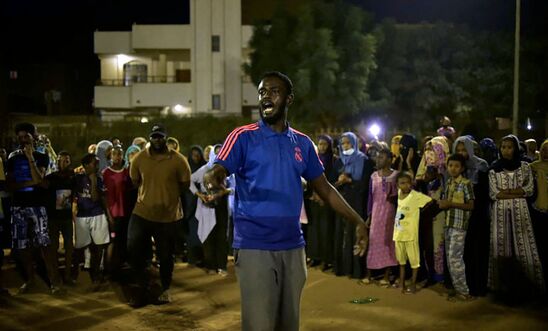
Press releases
Sudan: Military leaders must stop bloodshed at protests and fully investigate killings

At least six men killed and 140 wounded; more protests planned tomorrow
‘The world is watching and will not tolerate further bloodshed’ - Deprose Muchena
‘I couldn’t even look at his body. His face was mutilated beyond recognition. He loved his country very much and he was my only brother’ - Gamal Abdel Nasir
Sudanese authorities must stop security forces from using unnecessary force, including lethal force, against protesters opposed to the military takeover, withdraw the military from law-enforcement operations, and respect the right to freedom of peaceful assembly, Amnesty International said today.
Security forces killed at least six men and wounded another 140 by shooting live rounds into multiple crowds of protesters in the capital Khartoum earlier this week. Further protests are expected tomorrow (Saturday 30 October).
Deprose Muchena, Amnesty International’s Regional Director for East and Southern Africa, said:
“At least six men were shot dead in cold blood and hundreds injured, some critically, simply for exercising their right to peaceful assembly. This is unconscionable and must not be allowed to happen again.
“Sudan’s military leaders, led by General Abdel Fattah al-Burhan, must make no mistake about it: the world is watching, and will not tolerate further bloodshed. They must order effective and independent investigations into the killings and ensure that anyone suspected of responsibility for arbitrary or abusive force is prosecuted in fair trials. They must also direct their security forces to desist from using such force at any future protests.
“We call on Sudan’s military leaders to ensure their security forces observe restraint, and respect and uphold the right to peaceful protest in line with the country’s own laws and international human rights standards.
“They must also take steps to reverse all measures and actions that trample on human rights, including by releasing all those who have been arbitrarily detained since the military takeover and restoring full access to the internet which has been partially shut down for days.”
Military takeover protests
The protests erupted in Khartoum and some provincial towns, including Madani in central Sudan and El-Fashir in Darfur, in response to General Abdel Fattah Al-Burhan’s announcement declaring a military takeover and a state of emergency across the country.
The announcement came a few hours after the military detained Prime Minister Abdalla Hamdok and several of his ministers, with whom the military had shared power shortly after the overthrow of former president Omar al-Bashir.
Protestors killed
Gamal Abdel Nasir, 23, was killed near the army headquarters in Khartoum, and suffered gunshot wounds to the eye and hand. His brother told Amnesty: “I couldn’t even look at his body. His face was mutilated beyond recognition. He loved his country very much and he was my only brother.”
Muhammed Al-Sadiq Musa, 27, was also shot and killed outside the army headquarters. A close family member who was at the protest told Amnesty that he was shot and mortally injured when soldiers opened fire after a group of four or five protesters picked up rocks and hurled them in their direction.
The family member said: “That’s the last time I saw him alive. When I arrived at the hospital the doctors had already pronounced him dead. I was asked to identify the body. I saw gunshot wounds, one in the right side of his neck and the other in the side of his right kidney.”
Both Gamal and Mohammed were killed by security forces. In neither case would lethal force have been warranted.